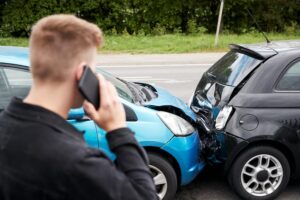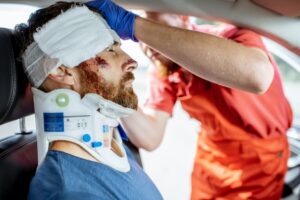What to Do After a Car Accident Injury
After a car accident, you may have serious injuries. At the least, you may feel confused as to what to do. Depending on your injuries, you should take steps to secure the scene of the accident. In many cases, the Department of Transportation recommends moving vehicles to the side of the road if they are running.
Of course, you must take care that other drivers, especially rubberneckers, do not hit you or the vehicles involved and cause more damage. If you have already been in an accident, don’t hesitate to contact an auto accident attorney to discuss the injuries and damages of your case. At Boohoff Law, we have been assisting people after car crashes for years, with a history of getting their clients favorable results.
Request A Free Consultation Today!
What to Do After a Car Accident if You Can Safely Move

If your injuries are such that you can move safely, first call 911, then check on the other driver and your passengers. Move your vehicle out of the way, if you can, and put on your hazard lights. Set up emergency cones or flares if you have them. Always be aware of other drivers. They will look to see what happened instead of paying attention to what is in front of them.
Get Contact Information and Photos
Exchange insurance information and other relevant items from the other driver, including their full name, contact information, insurance company, policy number, driver’s license, and the other driver’s insurance card. Also, write down the other driver’s license plate number and the color and make of their vehicle. If there are multiple drivers involved, write down or take pictures of their driver’s license numbers as well. Give the other driver or drivers the same information for yourself.
You’ll want to take pictures of the accident scene if you are able to. When you take pictures:
- Get distance pictures showing skid marks;
- Get pictures showing both motor vehicles from multiple angles;
- Take close-up pictures of the damage to your vehicle; and
- Take close-up pictures of the damage to the other vehicle.
While you are taking close-up pictures, don’t take them so close that others can’t tell what they are looking at. Photos need context. For example, when you take a picture of a dent in a fender, take it far enough away to show the entire fender yet close enough to show the vehicle damage.
While the police or accident investigators will also ask for your license and vehicle registration and will take pictures, it is better if you have your own documentation. You may also wish to write down the name and badge number of any officials you speak to. If the police are unable to come to your location, you can also go to the nearest police station to file an accident report. This report will contain details about the accident, including weather and traffic conditions, the condition of the injured, and their identities, and may prove valuable in the insurance claims process.
Once you take pictures, if the vehicles are movable, move them out of traffic if you can do it safely. If your vehicle moves, but the other driver’s vehicle will not move, leave both vehicles where they are.
Get Additional Documentation
If you can get the following documentation, it could help your case down the line:
- All of the police officers’ names and badge numbers, even those you did not speak with. If you need to file an accident injury lawsuit, your attorney may call the police officers as witnesses. Getting their information helps save time when an attorney locates witnesses to help you.
- Find out where you get a copy of the police report. Insurance companies use police reports to determine fault — but so do courts and attorneys. Accident attorneys also review police reports to help create a picture of what might have caused the accident and may not come to the same conclusions as the insurance company or the police.
- Speak with witnesses to the accident. Because an accident happens unexpectedly and often quickly, you may not see everything that happened or may not remember it. Witnesses often fill in the blanks. Write down what witnesses have to say, including their names and phone numbers.
When it’s safe to leave the scene of the accident, you may choose to call roadside assistance if your insurance policy offers it. They may be able to provide you with a tow, transportation, and even a rental car for a time if your vehicle is undrivable.
What to Do After a Car Accident If You Have Serious Injuries

If your injuries are too severe for you to move, and you have another person with you who is not seriously injured, ask the other person to gather information. Do not allow anyone to move your vehicle. If you cannot safely move because of injuries and can talk, and a witness or the other driver checks on you, make sure someone calls 911 if you can’t do it yourself. Always stay still if you believe you have broken bones or other internal injuries. You could do more damage if you try to move, especially if you injured your back, neck, or head.
Always Get Medical Attention
Even if you believe you are not injured, it is advisable to get checked out by the emergency room or your doctor. Because of the adrenaline surge and other factors, injuries may not show up for hours or even days later. In some cases, such as concussions, symptoms may not show up for days, weeks, or months. Remember that the cost of medical treatment can likely be recuperated through a personal injury claim or your insurance coverage.
Notify Your Insurance Company
Different states have different legalities regarding who is obligated to pay for damages in an accident. Washington, for example, is a fault state when it comes to financial responsibility for car accidents. This means the person who was at fault for causing the car accident is also responsible for any damage resulting from the accident. If the other driver’s coverage is not enough to cover all of the damages you are entitled to, the other driver did not carry insurance, or your supplemental underinsured motorist coverage is insufficient, you may need to file a lawsuit against the other driver to collect full compensation for your damages.
On the other hand, Florida is one of a handful of no-fault states. If you live in a no-fault state, you can turn to your own insurance policy for coverage.
Regardless of where you live, you should report the accident to your insurance agent of the accident and that you are making a claim. If you can’t notify your insurance company, a loved one may do so for you. However, only give the insurance company your name, policy number, the location and time of the accident, and your attorney’s contact information. If the other driver’s insurance company or attorney contacts you, refer them to your attorney.
An insurance adjuster will then evaluate your claim, but it’s likely that this initial estimate will be far less than what you actually deserve. An insurance company is in business to make money. Even your own insurance professional may not have your best interests in mind—it has its bottom line in mind. An insurance company will often pay you just enough to make you “go away.” That amount may not cover all of your medical bills that are related to the accident or all of the repairs needed to your vehicle—or its replacement value.
An auto accident lawyer can help you understand your car insurance claim and help you get as much value as possible out of your policy. If you get an attorney involved in the auto insurance claim, the insurance company is more likely to give you a better settlement offer since the likelihood of going to court is higher than if you were to try to settle with the insurance company yourself.
Avoid Implicating Yourself
Your immediate emotions after an accident can be overwhelming but try to remain calm. Even if you believe you were at fault, never admit liability at the scene. There may be factors you aren’t aware of that contributed to the accident.
You should avoid discussing the accident with anyone and giving away information that could be used against you. While it’s okay to exchange basic information with the other driver, do not get into a detailed discussion about the accident. You should especially avoid discussing fault or specifics with the other driver’s insurance company without consulting with an attorney.
You should also avoid posting about the accident on social media or anywhere public. Anything you post about the accident on social media can be used against you. It’s best to refrain from discussing the accident or posting photos until all legal and insurance matters have been resolved.
Speak With a Car Accident Attorney
Contact your car accident attorney to set up a consultation to discuss your vehicle accident. When you contact the attorney, let him or her know that your insurance company may be calling for information about the accident.
If you can’t contact your insurance company and attorney yourself, be sure a loved one contacts everyone for you. You must notify your insurance company as soon as possible, as some car insurance companies give you very little time to file a claim.
Give your attorney’s contact information and your insurance company’s information to family members if you are injured badly enough that you cannot make these calls yourself. Don’t forget to remind family members to give minimal information to insurance companies and to let your attorney give the insurance company detailed information so as not to implicate you for fault. Even if you are not at fault, the insurance company could twist what you or a family member say just so it has an excuse to pay out less.
Obtain Medical Records
You will need copies of your medical records and invoices showing your injuries and the cost of your medical care. If you suffered serious injuries in an accident and you expect long-term or permanent injuries, you will need medical documentation showing that. You might be entitled to more than reimbursement for past medical costs associated with the accident.
Serious injuries often require additional medical care, including but not limited to physical, cognitive, occupational, and psychological therapy. Physical injuries that take a long time to heal or that never heal often cause depression and other psychological issues in injured people.
Additionally, those who feel they are a burden on family members or friends may also suffer from anxiety and/or depression. Additionally, you may suffer from post-traumatic stress disorder (PTSD) because of a vehicle accident. PTSD could cause anxiety if you try to drive or even if you ride as a passenger in the car, among other issues.
Some people may need extended therapy to help with those feelings of anxiety or depression. If you have trouble getting medical records for all of your injuries, let your car accident lawyer know. He or she may help you get copies of your records.
If You Are a Witness to an Accident
If you saw the accident happen and the drivers ask you what you saw, give the same account to anyone who asks. The police will also ask you what happened for the accident report, as they must write down witness information. Sometimes, people cannot be “bothered” when making a statement because they don’t want to get involved. However, your statement may help a driver get the compensation he or she is entitled to if both drivers have conflicting accounts.
How to Avoid Car Accidents
According to the Insurance Information Institute, nearly 10 million cars occur annually in the United States. Accidents are difficult to avoid, mostly because they are unexpected. Lower the chances of being in an accident by driving defensively. This means that you always pay attention to the road.
If you notice another accident, slow down and turn your emergency flashers on. When other drivers see your emergency flashers, they know to slow down sooner than they otherwise would have slowed down. The flashers also alert other drivers that there is a problem ahead.
Stay Alert and Stay Safe
If you are distracted, and you cause an accident, not only may the police charge you, but you could find yourself serving time in jail or even paying punitive damages to the person you injured. Paying attention not only helps you avoid accidents that already happened, but it also prevents you from being injured should you cause an accident. If you come upon the scene of an accident and are not watching in front of you, you could contribute to additional damage and injuries if you hit other vehicles involved in the accident or cause additional injuries if you hit first responders.
Taking a defensive driving course is another way to help avoid accidents. The course will teach you how to avoid sudden accidents in front of you, objects in the road, and other people whose actions may cause you to wreck. Some insurance companies offer a discount on your insurance if you take driving classes.
Prepare for an Accident
Preparing for an accident may also save your or another person’s life. Always keep an extra blanket, a first-aid kit, a flashlight, and water in your vehicle. If you should get into an accident and suffer minor injuries, you can clean and cover visible injuries to prevent open wounds from becoming infected. The extra blankets help those injured and are feeling cold because of shock or because it’s cold outside. Even in the summer, when it’s hot enough, you should always have an extra blanket with you.
You should also carry emergency triangles, cones, or flares to set out on the road after the accident. These bright orange devices warn people about an obstruction ahead and will hopefully keep them from running into you or your vehicle. The first aid kit should contain supplies to clean minor cuts and bandages to cover minor wounds to prevent infection. If a piece of metal cuts you, always go to the hospital for a tetanus shot, unless you’ve recently had one.
Frequently Asked Questions About Car Accidents
What if the other driver doesn’t have insurance or flees the scene?
If you find yourself in an accident where the other driver is uninsured or commits a hit-and-run, the first step is to call the police and file a report. This provides official documentation of the incident which can be crucial when making a claim. Next, contact your insurance company and notify them about the situation. Depending on your policy, you might have coverage under “uninsured motorist” or “underinsured motorist” provisions.
This can compensate you for injuries or damages caused by a driver without adequate insurance. Document any evidence from the scene, including photos, witness statements, and any possible details of the fleeing vehicle. If the driver fled the scene, any bit of information (like a partial license plate number or car description) can be helpful in tracking them down.
Should I accept the first settlement offer from an insurance company?
Probably not. It’s tempting to accept the first settlement offer from an insurance company, especially when faced with mounting bills and financial stress. However, initial offers can often be lower than what is fair or what you might be entitled to. Before accepting, evaluate the full extent of your damages — both physical and property. Consider future medical treatments, lost wages, and other long-term impacts of the accident. Consulting an attorney is vital. They can provide insight into the fairness of the offer and negotiate on your behalf. Remember, once you accept a settlement, it’s usually final, and you can’t go back later and ask for more if you realize the funds don’t cover your needs.
Can I claim compensation if the accident was partly my fault?
The ability to claim compensation when you’re partially at fault varies depending on where you live due to different negligence systems. In Washington, the system of “pure comparative negligence” applies. This means that if you are involved in a car accident, you can recover damages even if you are partially at fault. However, your compensation will be reduced by the percentage of fault attributed to you.
Unlike some other states, there’s no threshold of fault that bars recovery. Even if you’re found to be 90% at fault, you can theoretically recover 10% of your damages. However, it’s essential to consult with an attorney familiar with Washington’s negligence laws to understand how they might apply to your specific situation and who can work to maximize the outcome of your car insurance claim.
How long after an accident can I file a claim or lawsuit?
The timeframe within which you can file a claim or lawsuit is governed by a legal principle called the “statute of limitations,” and it varies based on your jurisdiction and the nature of the claim. For personal injury claims in Washington, this is three years from when the accident occurred.
It’s critical to act promptly after an accident to ensure you don’t miss any deadlines. If you fail to file within the set period, you could lose your right to pursue compensation permanently. Always check with local legal professionals like those at Boohoff Law to know the specific timeframes applicable in your area.
Should I keep a record of expenses related to the accident?
Yes, maintaining a comprehensive record of all expenses related to the accident is paramount. This includes obvious costs like medical bills and car repair invoices, but also less evident expenses like transportation to medical appointments, over-the-counter medication, and even wages lost due to missed work. Having a detailed account can be invaluable when negotiating with insurance companies or if you need to go to court.
Additionally, it’s not just about bills and receipts; consider maintaining a diary detailing your physical and emotional health post-accident, which can provide insight into the accident’s impact on your daily life. This can be helpful in cases where you’re seeking compensation for pain and suffering or emotional distress.
Don’t Take Chances After a Car Accident. Contact a Car Accident Attorney Today.

If you have further questions following a car accident, contact a personal injury lawyer at Boohoff Law for more information. Our legal professionals can help you navigate the insurance claim process, investigate the accident to help improve your chances of maximizing financial recovery, and protect you from insurance adjusters and those who may try to undermine your rights.
Free Consultation
We Are Here For You 24/7
Reviews
– Elissa M.
“Really pleased with Boohoff Law! Received immediate responses when I had any questions. Treated amazingly by all staff … made this process a true breeze!”
– Caitlyn M.
– Brandy K.
Related Posts
I Was Partially At-Fault in a Rear-End Crash. Can I Still Get Compensation in Florida?
I Was a Passenger in an Uber Accident. What Are My Rights?
What Damages Can I Recover After a Jackknife Truck Accident?
Recovery is personal.
We’re here for you.
We’re close by. And if you can’t make it to us, we’ll meet you where you need us, at home or in the hospital.
You're better off with Boohoff.











The information on this website is for general information purposes only. Nothing on this site should be taken as legal advice for any individual case or situation. This information is not intended to create, and receipt or viewing does not constitute, an attorney-client relationship.
available 24/7
(877) 999-9999
